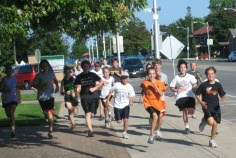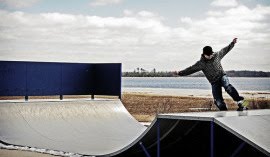Net-Zero Energy and Homeless Shelters
Monday, January 12, 2009
 Building Net-Zero Energy Structures for the Homeless Could be Most Powerful Step to Community Revitalization
Building Net-Zero Energy Structures for the Homeless Could be Most Powerful Step to Community RevitalizationBy Bobbie Stacey - Founder of Home Run Innovations Inc.
What has net-zero energy construction got to do with homeless shelters?
First of all, Escanaba and most of the other towns in Delta County are officially (by government funding standards) considered to be impoverished - a status that qualifies us for Brownfield Redevelopment and other "blighted" community re-development incentives.
Secondly, if cold-climate, net-zero energy construction can be accomplished here, with our gray winter skies, it can be done almost anywhere else in the world. The US Department of Energy Zero Energy Buildings Database lists only 7 (yes, that's only SEVEN) net-zero energy buildings with only 3 of them located in cold-climates. SUCCESSFUL NET ZERO ENERGY BUILDING CONSTRUCTION OR REHABILITATION WOULD BRING DELTA COUNTY TO THE ATTENTION OF THE ENTIRE WORLD.
Thirdly, the Michigan State Housing Development Authority will grant up to $25,000 funding per unit for construction or rehabilitation projects that provide low-income housing for at least 5 years.
Please look at the picture of the 100-year-old net-zero energy New Jersey farmhouse above. Does it not remind you of many, many houses in the older parts of Escanaba?
What if a small local non-profit could get manufacturers and distributors of energy-saving materials and technology to donate supplies and advertising/PR dollars to rehab a duplex or triplex within walking distance of Ludington Park that would be used for transitional housing for our homeless?
Better yet, what if the same property was sold at market value to a private buyer at the end of the mandatory 5-year MSHDA lease period? What if the capital gains from the sale were rolled back into another similar rehab project in a different neighborhood, also to be used for transitional housing needs over another 5-year time period - again and again?
Picture that same farmhouse, with ZERO ENERGY BILLS located in a neighborhood between Matt Sviland's Ludington Lofts project on 17th Street and Ludington Park to the east. Would any of you consider retiring to a duplex like that, not only living with zero energy bills, but also with the option to supplement your retirement with rental income? What about the desirability of living in a traditional neighborhood within easy walking distance of the lake, the public library, the Bonifas Arts Center and the Hereford and Hops? Could such a property be an alternative to someone who might typically be attracted to places like Eugene, OR, if not for the higher costs of living there?
Recycling dispersed, older neighborhood properties this way would create desirable residences out of eyesores, reduce the initial zero-energy construction cost barriers to entry for private individuals, and (because of the 5-year turnaround) prevent any one neighborhood from acquiring the reputation of a low rent district so common when large shelters are erected.
I sincerely need the opinions of former residents who since moving away have grown to truly appreciate the assets of Delta County and the Upper Peninsula. I also need input from you who have always remained. One has to live here to fully appreciate the quirks, potential obstacles and citizen dynamics both positive and negative.
Net zero-energy construction can be our solution to homelessness.
Home Run Events: Innovative Ideas for Community Revitalization by Roberta (Bobbie) Stacey is licensed under a Creative Commons Attribution-Noncommercial-No Derivative Works 3.0 United States License









1 comments:
You outline a great vision, and as petro-fuels become more scarce, this kind of thinking will become mandatory. And there are more resources all the time to help move this kind of vision from thinking to action. It's a groundswell, and it would be great if Escanaba and Delta County could get out in front.
Post a Comment